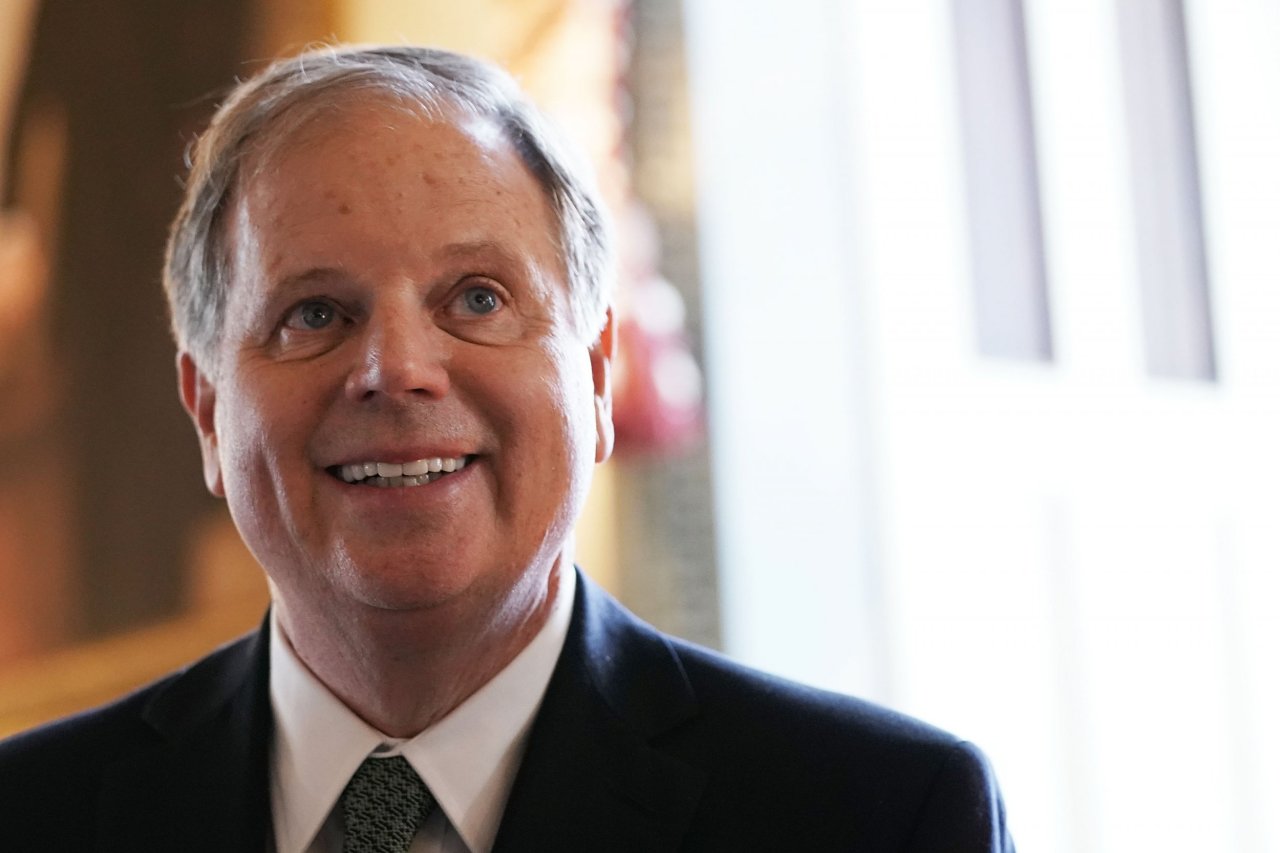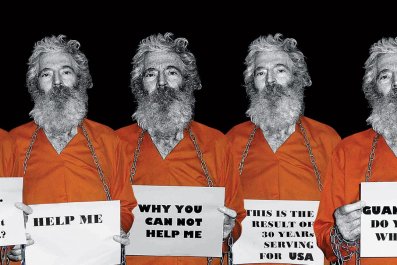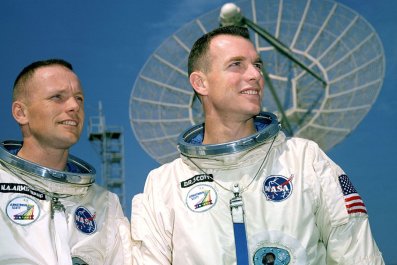Doug Jones was just 9 years old when Ku Klux Klan members bombed the 16th Street Baptist Church in Birmingham, Alabama. The 1963 blast killed four young girls and awakened the nation to the dangerous struggle for civil rights in the Deep South.
Growing up in Fairfield, just outside the city, Jones has vivid memories of Governor George Wallace standing in the doorway at the University of Alabama to prevent black students from entering, a racist act that one of the bombers later said inspired him to commit terrorism.
Nearly 40 years later, as United States attorney for the Northern District of Alabama, Jones prosecuted Thomas Edwin Blanton Jr. and Bobby Frank Cherry for their roles in the bombing. The delayed justice for the families of the victims and the surrounding community was a step forward, he says—but there's still more to be done, and he sees some of Wallace in President Donald Trump.
That's what inspired him to write his new book, Bending Toward Justice: The Birmingham Church Bombing that Changed the Course of Civil Rights (All Points Books). Jones, now a U.S. senator after winning a remarkable special election in Alabama in 2017, saw deeply unsettling echoes of the past in Charlottesville, where white nationalists carrying tiki torches chanted "Jews will not replace us." He sees it in discrimination against the LGBTQ community, and he sees it in the hesitations of politicians to condemn acts of bigotry; Trump famously declared that there were "very fine people on both sides" in Charlottesville. Jones doesn't necessarily think the president is stoking hate on purpose, but he's stoking it nonetheless.
The freshman senator talked to Newsweek about the legacy of the Deep South, the power of forgiveness and the future of the Democratic Party.
Why did you feel the need to tell this story now?
I think we're sliding backwards. We're seeing an increase in voter suppression in the name of political power and it hurts all minorities. We're also seeing a rise in hate crimes, and more anti-Semitic crimes than we've had in years. There's more hateful speech out there. We saw what happened in Charlottesville. I think it's important for folks to read this book because we tend to forget the sacrifices and hard things people went through in the 1950s and 1960s. If we don't learn the lessons from history, we're doomed to repeat the bad things, so I think now more than ever, people need to see and understand fully the sacrifices made by the civil rights movement so we can prevent similar types of terror in the future.
In your book, you describe visiting Thomas Edwin Blanton Jr., the man you prosecuted for the 1963 Birmingham Church Bombings, in prison. Why go back?
Getting someone to admit what they did and to accept that responsibility and apologize, that has such a healing value to communities affected by hate crimes like this. He was getting older—he's in his eighties now—and I thought it was a good time to give it a shot. He was coming up for parole, and he had been in prison for a long time and had the opportunity to think about this. It's incredibly important to get people to accept responsibility for what they did, to say that they were wrong and to apologize to the greater community. When it comes to those old crimes like that, people are yearning for a little bit of reconciliation in addition to a measure of justice.
Blanton won't admit he was guilty, but the African American guard you spoke with afterward still asked you to parole him...
There's a lot of people who might not have forgiven him but the guard afterwards said "no one should have to die in prison," and it struck me as well. Look back at what happened in Charleston, the victims of [shooter] Dylann Roof forgave him fairly quickly. I think victims can be forgiving, but for the greater community, it's just so much better when someone can acknowledge their responsibilities and talk about that and ask for forgiveness. It's just much more meaningful.
You talk a lot about the concept of delayed justice. What do you hope to see justice for?
The concept of delayed justice led me to this piece of legislation, the Civil Rights Cold Case Records Collection Act. Senator Ted Cruz co-sponsored it with me, it passed both houses of Congress and it was signed into law by the president. It allows these federal records to be released to the public. I'm hoping to get people to recognize and understand the horrors that can happen in the name of hate. We still see that so much today, and it's not just race, it's religion, it's gender. I'm hoping that people will understand that we really have to work for the creed that all men and women are created equal. One of the ways to do that is to remind people of the pieces of our history that we're the least proud of.
You recently tweeted about an interview between Stephen Colbert and the actress Ellen Page, where she expressed concern about the Trump administration inciting hatred and violence against the LGBTQ community. Is that something you're worried about?
Yes. I do think sometimes people get so caught up in their own zealousness about an issue that they forget how much words matter. They have a pulpit by which people can take things the wrong way, and there's a lot of people out there looking toward them for a green light to do bad things. But I want to make it clear: I'm not saying that these guys are intentionally trying to incite violence. I do not believe that. But I do believe that some of their words unintentionally can give a green light to people, and that's what we've got to be careful of.
You write that the Republican Party is losing its soul. What do you mean?
Voter fraud is a non-issue in the country. But Republicans are doing things under the guise of preventing voter fraud that are designed to limit access to the ballot box. This is a clear, concerted effort, especially in states in the Deep South, to try to stop minorities from participating in voting. You only have to look at what happened in Georgia [where then-Secretary of State Brian Kemp was in charge of counting ballots in his own gubernatorial race], or look at what the Secretary of State of Alabama said, that voting is a "privilege" that has to be earned as opposed to a right. Look at the tough voter ID laws in Texas, North Carolina and Alabama, as well as the gerrymandered districts in the House of Representatives and in legislatures all over the country. Those are designed to concentrate the minority and black electorates into specific districts and to dilute their overall voting power.
But there are some signs that the South is turning purple: your successful election, Beto O'Rourke in Texas...
Let's be candid: When you see a Democrat elected to the Senate from Alabama, that gives a lot of people pause. There's a lot more hope and a lot of things we can do. The issue is that we've got to play long ball. We can't just go from one election to the next and win here, lose there and think we're learning lessons. We've got to play long-term strategies here. We're not going to turn the entire South blue or even purple overnight.
Yes, you see the demographic changes, the enthusiasm that Democrats have, the younger voters that are turning out. At the same time, remember that the Democratic Party wrote off the South for a generation, so our bench is not very strong. That said, we've got some great folks: Stacey Abrams in Georgia and Andrew Gillum in Florida and Beto O'Rourke in Texas. I'm hopeful that as we go forward there's going to be a renewed emphasis on doling out resources in the South.
Do you worry about progressive Democrats like Alexandria Ocasio-Cortez?
Well, I don't worry about the direction they're taking the party in because I think that they're important voices and there is a constituency for those voices. But as a practical matter, you cannot flip the switch in this country and go from one side to the other, so there's got to be a more pragmatic approach and I'm hoping that those voices also see that change can come, but it will be incremental and may not be all the change that they're advocating for at this point. Governing is not the same as campaigning, and governing requires an element of give and take. Compromise has become such a bad word in political circles on the right and the left these days. Compromise in government should not be considered a battle lost. It should be considered progress.
But some would say these progressive, or democratic socialist views are what the Democratic party wants...
Donald Trump has campaigned on all things to the right, but he's accomplished very little because he approaches it as 'my way or the highway.' The art of the deal is different than the art of governing. So even when these folks are running on certain things, they may get a nomination or win the presidency, but it's still going to be difficult to try to get those plans enacted because you have to govern the entire country, not just from the far right or the far left.
Joe Biden is a good pal of yours. What are you thinking about a potential 2020 run?
I've talked to Joe several times about the pros and cons of running. I've always believed that of all of the politicians and public servants that I've met in my life, Joe would make a great president. He's got all of the qualifications, he's got the temperament and I think he's got that appeal that can reach across a broad section of the American public. I mean, young, old, black, white, Hispanic, you name it--Joe can reach a lot of different people and I think that's the kind of leader that we need. Whether he ends up running or whether he ends up getting the nomination, I really don't know, but I still think someone with that kind of appeal, that broad base appeal is really what the country needs, especially following Donald Trump.












